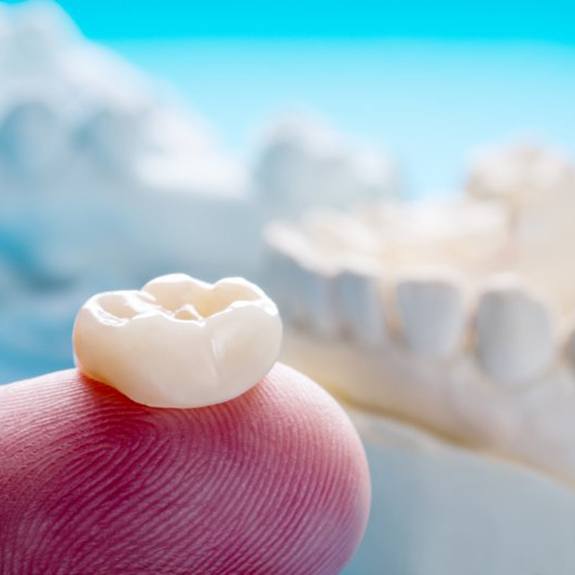Information?

The part of your tooth that you see when you smile, also called its crown, is subjected to an onslaught of attacks every single day. Not only does it withstand regular barrages from food, digestive fluids, and bacteria, but it’s tasked with protecting the underlying sensitive layers of your tooth. These responsibilities can sometimes cause the tooth’s crown to become compromised. Unless we repair the tooth, it will have to be extracted. Fortunately, dental crowns in Grand Prairie can restore the functionality and aesthetics of your tooth. Contact Real Dental today to learn more!


A dental crown is a restorative treatment that fits like a cap over your natural tooth to protect it from further damage while also improving the way it looks. Crowns can be made from all sorts of materials, such as silver or gold, but here at Real Dental, we like to use dental porcelain. This substance is able to mimic tooth enamel almost perfectly in both appearance and feel.

The only way to know for certain whether you’re a good candidate for a crown is to schedule a consultation with one of our dentists. We may recommend a crown to treat a tooth that:

During the first of two appointments, your dentist will begin by shaving off a thin, conservative layer of enamel from the tooth that needs the crown. This ensures there is plenty of room for it to lay flat in your smile.
Once your tooth is fully prepared, we take impressions of it and send the data to our partnered dental lab. While they get to work custom making your crown, we can place a temporary to protect your tooth in the meantime. In a few weeks, when your final crown is ready, you’ll return to our office to have it cemented in place.
When a tooth has sustained severe damage, our only options are to repair it or remove it. Since missing teeth can contribute to a slew of oral health problems, we try to avoid extraction whenever possible. Dental crowns are a great way to prevent the damage that would make extracting a tooth necessary. Some additional benefits of dental crowns are:

Once we’ve determined that a dental crown is the best treatment for your tooth during your consultation, we’ll provide you with a detailed cost estimate for the procedure. Every dental crown is unique, and there are several factors that largely determine how much receiving one can cost. We’ll make sure that you understand exactly what you will be paying for before you commit to the treatment. Here’s a brief overview of the cost of dental crowns, but please contact the team at Real Dental if you have any questions.

The overall cost of your dental crown will be mostly determined by several factors such as:
It’s important to remember that cheaper is not always better. Seeing your dental crown as an investment in your comfort and your oral health can set you on the path to the best possible results from the treatment.

Dental crowns are often seen as a medically necessary restorative procedure, meaning that dental insurance plans usually cover them at around 50%. However, your crown may not be covered at all if it is being placed for purely cosmetic reasons. Our staff will be more than happy to help you navigate your insurance policy so you can get the most out of it.

We offer several options to help make dental crowns more affordable for patients on a budget. A few of these include:
The only way to know for sure what you can expect to pay for your dental crown is to discuss the matter with us at your consultation. We’ll be glad to go over your financing and payment options with you to help you find the best way to get the help you need.
If one of our dentists here at Real Dental has recommended a dental crown as part of your treatment plan, you may have a few questions, especially if you have never had a crown before. To make the process a bit more convenient for you, we’ve included the answers to a handful of frequently asked questions about dental crowns below.
In order to place a crown, we will most likely need to slightly modify your existing tooth structure. You shouldn’t experience pain during this procedure thanks to local anesthetic, but you may feel a bit sore or sensitive for the next day or two. This discomfort should only be mild and should subside after a couple of days.
Receiving a dental crown does not require any surgery and shouldn’t cause any serious pain or discomfort. Once your crown procedure is over, you should be able to drive yourself back to work, school, or home and resume your day as normal.
As the name suggests, a temporary crown is only fitted onto your tooth to protect it while the permanent one is being crafted in a lab. They don’t fit as well as the final crown will, and rather than porcelain, they are often made of acrylic or stainless steel. Also, they are not attached to the tooth as securely as your actual crown will be. So, while your temporary is on, it’s best to avoid chewing anything extremely hard or sticky with that tooth.
Unfortunately, this popular idea is actually untrue. While a dental crown can shield your tooth from structural damage, it does not make it immune to cavities. You’ll still need to brush and floss around that tooth like you would with any other tooth. Pay close attention to the area around the gumline to prevent bacteria from accumulating there and potentially causing decay.
The cost of a dental crown can vary greatly, so we can’t really give you a price estimate unless you come in for a consultation and we examine the unique factors affecting your situation. Keep in mind that even if a crown seems expensive at first, it will protect your tooth from further damage that could necessitate even costlier treatments, such as extracting and replacing the tooth.
Most dental insurance providers offer partial coverage for crowns (somewhere between 50% and 80% in most cases). We also offer low-interest financing through CareCredit and our in-house dental plan to help you fit the cost of your crown into your budget.
